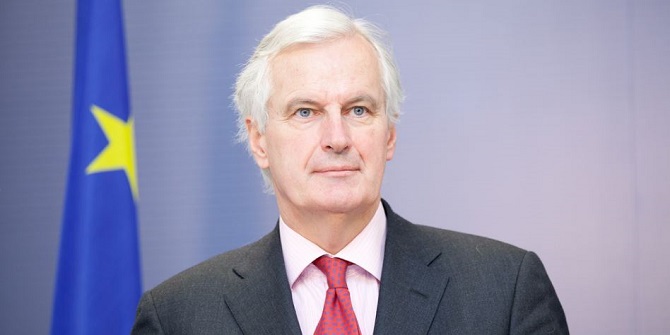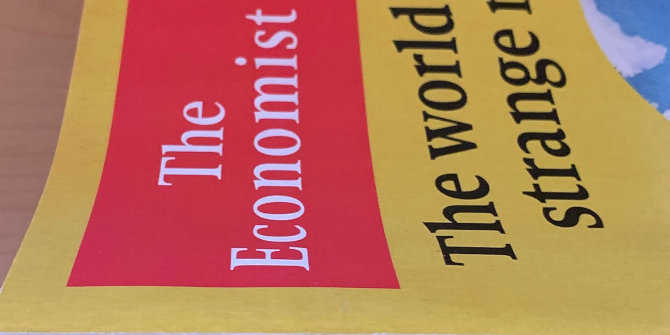 Michel Barnier, who has been appointed as the European Commission’s Chief Negotiator in the Brexit negotiations, indicated on 6 December that should the UK trigger Article 50 in March 2017, then an exit agreement could be reached by October the following year. Thomas Cole writes that Barnier’s statement gives a clear signal that the EU would like to conclude Brexit as quickly as possible, and that the UK will have to move quickly if it wants to secure favourable exit terms.
Michel Barnier, who has been appointed as the European Commission’s Chief Negotiator in the Brexit negotiations, indicated on 6 December that should the UK trigger Article 50 in March 2017, then an exit agreement could be reached by October the following year. Thomas Cole writes that Barnier’s statement gives a clear signal that the EU would like to conclude Brexit as quickly as possible, and that the UK will have to move quickly if it wants to secure favourable exit terms.

At his first press conference in his capacity as Chief Negotiator for the European Commission in the Brexit negotiations, Michel Barnier suggested on Tuesday 6 December that the negotiations, if activated by the UK government by the end of March 2017, would have to be concluded by October 2018. This would then allow sufficient time to allow for full ratification by the EU’s member states, the European Parliament and the UK Parliament within the two-year time frame prescribed under article 50. Although the October 2018 deadline is merely advisory and falls within the two-year period, it clearly indicates what procedures and processes need to take place once an agreement is reached.
This announcement is a clear message that the European Commission is aiming to wrap up the talks quickly and does not want Brexit negotiations to go on any longer than two years. Nevertheless, by indicating that October 2018 is the desired end date, due to elections in the Netherlands, France and Germany (and eventually possibly even Italy), it is unlikely for the important decisions to be agreed to until after the formation of the next German Government, which could come as late as December 2017. In other words, if the October 2018 deadline is to be respected, the hardest and most crucial phase of the negotiations will not actually get going until January 2018, potentially almost a year after the UK government has given notification of its willingness to start exit talks.
It is unlikely that Michel Barnier and his team would not have already met with the negotiating team from the Council secretariat, representing the EU’s member states in advance of his announcement. And, it is also probable that Barnier had received a green light from the EU’s member states prior to announcing the October 2018 deadline.
What this means in concrete terms is that the Commission and the EU27 will look to adhere to the two-year limit. If negotiations are not going the way in which the UK government would like them to go then it will be for the UK government to speed up the process and try to achieve the best deal it possibly can. The two-year period prescribed in article 50 can be extended if agreed to unanimously by the EU’s member state governments, but Barnier’s announcement suggests that (at this stage in any case) this is not on the cards. What Barnier is also suggesting is that from his point of view, the UK better move quickly or risk being in a situation after two years in which it has no agreement and will be leaving the EU with no exit terms agreed at all. Such a scenario seems unlikely, however, and would not correspond to general EU practice of trying to negotiate a deal, even when it is only reached at the last possible moment.
What can be deduced from Barnier’s comments is that in a game of “blink” the Commission very much expects the UK to move first. Such an expectation is not unreasonable, where the UK will be the smaller party in the negotiations, with more to lose at the outset than the EU27. Events (especially the aforementioned elections) could of course dictate that the two-year time frame slips, although with European Parliamentary elections taking place in May 2019, neither side would want to countenance the possibility of the negotiations dragging on and playing out whilst these elections take place. This is especially the case given that the European Parliament will need to ratify the final deal agreed between the Commission, EU member states and the UK.
It is at this stage still unclear what the UK government’s Brexit strategy and aims are and whether there is a desire to stay within any EU structures such as the internal market and pursue an agreement similar to the EEA model (or indeed to try to stay in the EEA having left the EU). Comments made by the UK Secretary of State for Brexit, David Davis, last week and backed up by the UK Chancellor, Philip Hammond, suggest that this might be one such aim. This would also explain why at his press conference, Barnier hinted that the UK might look to pursue a relationship similar to those which Iceland, Liechtenstein and Norway currently enjoy with the EU (which is the EEA agreement). If this were the case, and given the proximity of EEA membership to full EU membership, then the two-year period for negotiations would likely be enough time to reach an agreement relatively quickly which could be agreed to even before the October 2018 deadline.
The negotiations have of course not started yet and until the UK government makes clear what its aims actually are then it will remain unclear how complicated the negotiations will become in practice. However, Barnier’s announcement suggests that the EU is looking to get Brexit done sooner rather than later and the ball is now very much in the court of the UK government to make the next move.
Please read our comments policy before commenting.
Note: This article gives the views of the author, and not the position of EUROPP – European Politics and Policy, nor of the London School of Economics. Featured image credit.
Shortened URL for this post: http://bit.ly/2gahdrs
_________________________________
 Thomas Cole
Thomas Cole
Thomas Cole is an International Political Analyst and a former European Commission Policy Officer.





“If negotiations are not going the way in which the UK government would like them to go then it will be for the UK government to speed up the process and try to achieve the best deal it possibly can.”
Remember, the Article 50 agreement is a housekeeping agreement, not a trade deal. If it’s not going the way the UK wants then there is no need for an agreement. If Mr Schauble wants 38 billion, absent an agreement he doesn’t get a bent cent.
Really, all the housekeeping issues can be left until the UK has left the EU and rolled up into the trade talks, it might be foolish to seek to come to two sequential agreements.
Complete misinterpretation. The only reason Barnier/Juncker wants to shorten negotiations is so there would still be time for an indefinite extension of membership to be approved by all of the EU 28 (including a referendum in the UK presumably) before the two year guillotine falls in accordance with 50(3). It also means that the plan is to try to make exit look as horrid and expensive as possible – an EU version of “Project Fear”. The problem with this idea is that the UK doesn’t have to accept such a one sided pitch: the EU is obligated to negotiate and conclude the exit agreement by 50(2). The UK can simply carry on after the guillotine has fallen – the EU will still be obligated to negotiate, since negotiations are only terminated by a successful conclusion of agreement. If Council decide to go with the Juncker/Barnier plan, it will waste time and most probably fail, leaving the EU panicking about how to pick up the pieces. Since there will be a new Commission and Europarl in 2019, there is a rather better chance of a sensible agreement once the present protagonists have left the scene. If the UK plans for this outcome it will hold most of the cards in the negotiation.
The sensible thing for Council to do is to take proper ownership of Article 50 negotiations, and appoint their own lead negotiator as they are entitled to do by 50(2) and 218(3), sidelining Barnier and his crew to a role of administrative support, and instruct them to negotiate sensibly towards a win-win agreement covering all the issues that Council are concerned about. That will be far better for them than ceding control to the Commission under arrangements such as Article 207 which require unanimity down to the level of “Wallonia”. Article 50 at least only requires a Europarl majority and QMV Council approval, and is under the guidance of Council.
” since negotiations are only terminated by a successful conclusion of agreement”
LOL
I’m sure there are plenty of people who are equally cynical about the EU’s ability to negotiate its way out of a wet paper bag: however, the point is what Article 50(2) says: “the Union shall negotiate and
conclude an agreement with that State”. Nowhere is there any time limit on negotiations, and the requirement to conclude the agreement survives exit, because it is the remaining members who are still obligated by that stipulation: strangely, there is no obligation on the withdrawing state at all. The only time limits imposed come in 50(3) and relate exclusively to when membership ends: it is frequently completely misinterpreted to imply that ending membership would terminate negotiations, when it says no such thing. “The Treaties shall cease to apply to the State in question from the date of entry into force of the withdrawal agreement or, failing that, two years after the notification referred to in paragraph 2, unless the European Council, in agreement with the Member State concerned, unanimously decides to extend this period.” The Treaties continue to apply to the surviving states.
Finally, the idea that the EU would never negotiate anything with the UK ever again after we leave is absurd. The problem for the EU is that their non-Article 50 negotiation rules work against them on a comparative basis, which is why it is in their interests to keep the Article 50 negotiations alive. The problem for the EU and the UK is that if the EU waste time on fruitless negotiating tacks, the UK could exit without an agreement in place, with at best some hastily cobbled interim arrangements, unless someone has prepared and tabled something more sensible.
yeah
keep dreaming in brexit land lover boy
the most fun thing about brexiteers is when you ask them to expose in details their “plans” and “ideas” : that’s when you realize the mumbo-jumbo jelly of what passes for their brains is not only made of earth-defying gravity, but also magical golden pot manufacturies
let me give you just one punt : EU negotiators will “listen” to what the UK side says they want.
they will then before october 2018 (assuming art 50 is declared by May in March 2017), made an offer to the UK on what they see as the terms of the divorce, excluding most future trade relationship, except a transitional EEA period (with face-saving limited border controls) of up to 5 years
the UK will decide either to accept, limit the impending damage of having no agreed-upon trade relationship with both the EU and the rest of the world (the status at the WTO will still be in limbo) or decide to go full depression for the next 5 years.
as a bonus, both the “3 brexiteers” will be given honorable discharge by resigning from the cabinet
believe whatever chimera you want, but I just can’t wait to see the huge climb-down called “reality” start to sink in in the UK